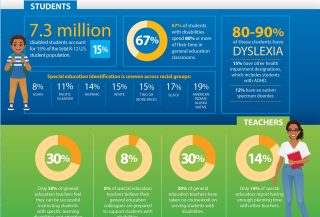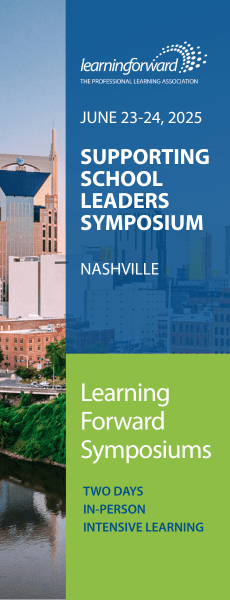RESEARCH
The research foundation for Standards for Professional Learning
By Elizabeth Foster
Categories: Research, Standards for Professional LearningJune 2022
Research has been at the heart of Learning Forward’s Standards for Professional Learning since they were first conceptualized and shared with the field in the 1990s. The standards are built on a decades-long foundation of research literature that describes the ways in which professional learning can improve educator knowledge, skills, and mindsets and, in turn, improve educator practice and student learning. Updating that foundation with new research findings is an essential part of ensuring the standards remain relevant and useful.
Along with lessons learned from 30 years of standards implementation and feedback from educators and field leaders, recent research and evidence have shaped the 2022 revision of Standards for Professional Learning. A team of researchers from the American Institutes for Research, with input from Learning Forward and the Standards Advisory Council Research Working Group, conducted a systematic literature review on professional learning. They paid particular attention to new research released since the previous version of standards was released in 2011. As a result, the new standards reflect the latest knowledge and findings, as well as the priorities and key issues for professional learning leaders today.
About the research we reviewed
Learning Forward considered many sources and types of studies, ranging from large-scale randomized controlled trial studies to qualitative and mixed-method studies, to case studies focused on a particular professional learning approach or intervention. Each of these types of studies offers its own benefits.
Randomized studies and meta-analyses can help identify measurable, reliable patterns and contribute to our understanding of which factors influence other factors. For instance, a recent analysis of 35 methodologically rigorous studies by the Learning Policy Institute found a positive link among teaching practices, student outcomes, and professional learning when that professional learning is content-focused, collaborative, job-embedded, incorporates active learning and adult learning theory, models effective practice, includes coaching and expert support, includes feedback and reflection, and is of sustained duration (Darling-Hammond et al., 2017).
Qualitative and mixed-method studies provide critical, detailed descriptions of professional learning that control group studies often leave unexplored. For example, qualitative studies of long-term professional learning efforts offer rich information about how a comprehensive approach builds the capacity of leaders and practitioners to continuously improve their practice to influence student learning. One such study by Pak, Desimone, and Parsons (2020) analyzes case studies of professional learning systems in five states to draw out the features of contexts that support effective professional learning, including collective participation and what they call “sustained coherence.”
Findings from studies of Learning Forward’s own partnerships and collaborations provide valuable information as well. One example is the case of Fort Wayne, Indiana, a district that has leveraged the standards in various ways for almost a decade, improving its overall culture and particular leadership practices and garnering important input about the professional learning needs of teachers and coaches (Psencik et al., 2019).
Our research review also intentionally examined research on standards implementation in various contexts. Notably, in 2016, a research team led by Carol Campbell did an extensive review of research literature and survey data from across Canada, resulting in the identification of three key components and 10 features of effective professional learning in the Canadian context that were consistent with features of effective professional learning in Standards for Professional Learning (Campbell et al., 2016). The study provides a look at similarities and differences in the way educators in different countries and provinces focus on inquiry, think about teacher agency, and use evidence.
Not only do the standards represent the best available research, the standards themselves have also been studied. American Institutes for Research led a literature review focused on studies using the 2011 standards as a framework and conducted a meta-analysis of randomized control trial studies that looked at the impact of professional learning aligned to standards on educator and student outcomes. The institute’s findings suggest that the implementation of standards is, indeed, a means to achieve better teacher and student outcomes. The meta-analysis found “consistent evidence that program alignment with the Learning Forward Standards for Professional Learning is associated with improved teacher instruction and student achievement outcomes” (Garrett et al., 2021). That research is described in more detail in the article at right.
How new research influenced new standards
New studies and evidence released since the last version of the standards informed the specific concepts and language of the 2022 revision, including the creation of new standards as well as updated language in longstanding standards. Following is a summary of the major themes from the research and how they influenced the 2022 Standards for Professional Learning.
Curriculum and instructional materials. The positive impact of access to high-quality curriculum and instructional materials on educator and student outcomes is increasingly borne out in the research (see for instance, Boser et al., 2015; Taylor et al., 2015) and is therefore an important update to the standards. Professional learning focused on implementing high-quality curriculum and instructional materials through instruction is also an equity issue, as research has found that students in low-income schools often have limited access to high-quality academic content, and teachers spend too much time searching for materials that meet their students’ needs, making the implementation of high-quality curriculum and instructional materials an important equity issue (Learning Forward, 2018).
Collaboration processes. Standards have always affirmed the importance of educator collaboration in improving individual and collective educator practice and the culture of the learning environment. While there has long been evidence that collaboration among educators leads to improved outcomes for teachers and students (e.g. Goddard et al., 2007), recent research provides critical descriptive detail about collaboration focused on instruction (e.g. Ronfeldt et al., 2015), and educator collaboration in day-to-day practice (e.g. Wilson et al., 2017). Recent research demonstrates how collaborative structures become even more effective when infused with an inquiry approach, address a combination of individual and collective learning, and build capacity for teacher voice and agency (e.g. Timperly et al., 2014; Hargreaves & Fullan, 2012).
School leadership. Research has long affirmed the role of the school principal in successful implementation (Desimone et al., 2002) and confirmed that effective school leadership is associated with better outcomes for teachers and students (Leithwood et al., 2004). And yet recent research supported by The Wallace Foundation reveals that principals have an even greater impact on student outcomes than previously thought and what characteristics and conditions lead to the greatest impact (Grissom et al., 2021) — a major contribution to the field and a critical resource for the revision of the standards.
Equity. Although equity has always been embedded in the standards, emerging research over the last decade highlights the positive effect of professional learning that includes equity-related content and strategies to understand and address educator and student backgrounds and beliefs. Several recent syntheses of quasi-experimental studies on professional learning and culturally responsive teaching reveal that bridging cultures in schools is increasingly becoming a strategy for improving teaching and learning, and the causal evidence related to outcomes for educators and students is developing. These studies describe the features of equity-focused professional learning and offer ideas about how to assess and design for quality (e.g. Bottiani et al., 2017; see also reviews by Aronson & Laughter, 2016, and Parkhouse et al., 2019).
Strategies such as culturally responsive teaching, which incorporates students’ cultures into instruction, are showing promise in improving students’ academic and social and emotional outcomes, affirming their identities, and helping them develop skills to identify and combat inequities. However, more rigorous research is needed to complement descriptive studies, better understand what effectiveness means and looks like, and articulate what components lead to better outcomes for students (Bottiani et al., 2017; Hill, 2020).
Social and emotional learning. Emerging research also points to the importance of understanding and specifically attending to social and emotional learning (SEL) in professional learning. Several large meta-analyses found that participation in SEL programs improved students’ academic performance, social and emotional competencies, and well-being and social behavior (Durlak et al., 2011; Taylor et al., 2017). Research shows that the best SEL approaches focus on concrete, specific, observable, and teachable skills and competencies (Jones & Kahn, 2017; Mahoney et al., 2018) — outcomes that well-designed professional learning can achieve.
Next steps for standards research
Looking forward, Learning Forward is eager to partner with research organizations and practitioners on research that will provide useful information, especially related to scaling effective strategies and isolating what leads to improvements in educator and student outcomes. The release of the revised standards is an opportunity to gather baseline data now, then formally study the implementation of professional learning strategies aligned to standards in a variety of contexts.
Learning Forward is also advocating for studies of new initiatives to more explicitly address how professional learning was initiated, conducted, and supported over the period of time covered in the research. There are often unanswered questions about the design of the sessions, how facilitators were selected, trained, and evaluated, and how leadership supported professional learning through policy and resources. The field would benefit from a consistent and transparent way of describing professional learning in research studies. Standards for Professional Learning, with the frames of Rigorous Content for Each Learner, Transformational Processes, and Conditions for Success, would be a perfect structure for a uniform description of professional learning in studies focused on teaching and learning.
Learning Forward stands firm in our commitment to help educators understand how to conceptualize, support, implement, and document the impact of professional learning so that it leads to excellent outcomes for educators and students. Therefore, Learning Forward will continue to sustain and strengthen our connection to and investment in research and evidence about high-quality professional learning.
Download pdf here.

Elizabeth Foster is the senior vice president of research and strategy at Learning Forward. She leads the organization’s research efforts for partnerships, programs, and fundraising. Elizabeth co-wrote the Standards for Professional Learning (2022) with Tracy Crow and now facilitates learning sessions about the standards and develops resources that support their use and implementation.
Categories: Research, Standards for Professional Learning
Recent Issues
LEARNING DESIGNS
February 2025
How we learn influences what we learn. This issue shares essential...
BUILDING BRIDGES
December 2024
Students benefit when educators bridge the continuum of professional...
CURRICULUM-BASED PROFESSIONAL LEARNING
October 2024
High-quality curriculum requires skilled educators to put it into...
LEARNING TO PIVOT
August 2024
Sometimes new information and situations call for major change. This issue...












